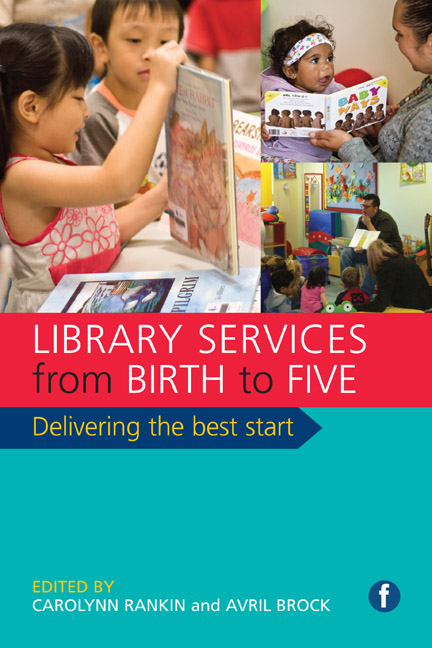Book contents
- Frontmatter
- Contents
- List of figures and tables
- Contributors
- Acknowledgements
- Introduction
- 1 Take them to the library: the pathway of opportunity
- 2 What you need to know about promoting early reading with young children from birth to five
- 3 Attribute value wrong, It should be `City of Literature ... it all starts with ABCD! The City of Melbourne and the Abecedarian Approach
- 4 Transforming practice through research: evaluating the Better Beginnings family literacy programme
- 5 People and partnerships, skills and knowledge
- 6 Resources for early years libraries: books, toys and other delights
- 7 Using digital media in early years library services
- 8 Using play to enhance early years literacy in babies and toddlers: ‘Read, Play and Grow’ at Brooklyn Public Library
- 9 Inclusive early literacy
- 10 Music and rhyme time sessions for the under-fives
- 11 Reaching your audience: the librarian's role
- 12 Successful library activities for the early years and ways to promote books effectively
- 13 Designing family-friendly libraries for the early years
- 14 Planning: organizing projects and money matters in the early years library
- Index
2 - What you need to know about promoting early reading with young children from birth to five
Published online by Cambridge University Press: 08 June 2018
- Frontmatter
- Contents
- List of figures and tables
- Contributors
- Acknowledgements
- Introduction
- 1 Take them to the library: the pathway of opportunity
- 2 What you need to know about promoting early reading with young children from birth to five
- 3 Attribute value wrong, It should be `City of Literature ... it all starts with ABCD! The City of Melbourne and the Abecedarian Approach
- 4 Transforming practice through research: evaluating the Better Beginnings family literacy programme
- 5 People and partnerships, skills and knowledge
- 6 Resources for early years libraries: books, toys and other delights
- 7 Using digital media in early years library services
- 8 Using play to enhance early years literacy in babies and toddlers: ‘Read, Play and Grow’ at Brooklyn Public Library
- 9 Inclusive early literacy
- 10 Music and rhyme time sessions for the under-fives
- 11 Reaching your audience: the librarian's role
- 12 Successful library activities for the early years and ways to promote books effectively
- 13 Designing family-friendly libraries for the early years
- 14 Planning: organizing projects and money matters in the early years library
- Index
Summary
Introduction
Competence in literacy is essential for life in contemporary society, and it dramatically contributes to people's emotional well-being, mental health and economic success. A range of particular skills, a breadth of reading materials, a depth of knowledge and understanding and positive attitudes are important for enabling young children to become capable, competent and active readers. The achievement of these skills lies not only with the children themselves but also with parents, carers, early years teachers, librarians and politicians. Books and other literacy materials, public libraries, early years settings, schools and school libraries all have roles to play in the successful development of children who will read for pleasure; for information and knowledge acquisition; and for educational attainment. How they engage in the reading process, the materials they access and their developing attitudes to reading are all key elements in achieving competence in literacy. There is much more to reading than just decoding symbols and stringing words together to make sense. Children need to become critical readers and thinkers, and the early years librarian can play a key role in ensuring that children do become so. It is therefore, important for librarians to gain an understanding of the reading process and the skills of reading in the 21st century.
Opening up the world of knowledge and understanding and finding there is lifelong satisfaction in communicating both with and without words, and in reading and writing, also equips children for survival in a fast-developing global world economy where the future is both known and unknown (Bruce and Spratt, 2011, 13).
In the USA MacLean (2008) observes how librarians are, to an extent, teachers – teaching children how to love to read, making literacy fun and setting the early literacy foundations needed for reading success. Therefore public libraries have a crucial role to play in helping young children to develop early reading skills. Knowledge of these skills and how to promote them with children, how to plan and deliver preschool story times, how to promote these in partnership with parents will enable librarians to make a difference to children's literacy and educational success.
- Type
- Chapter
- Information
- Library Services from Birth to FiveDelivering the best start, pp. 31 - 64Publisher: FacetPrint publication year: 2019

